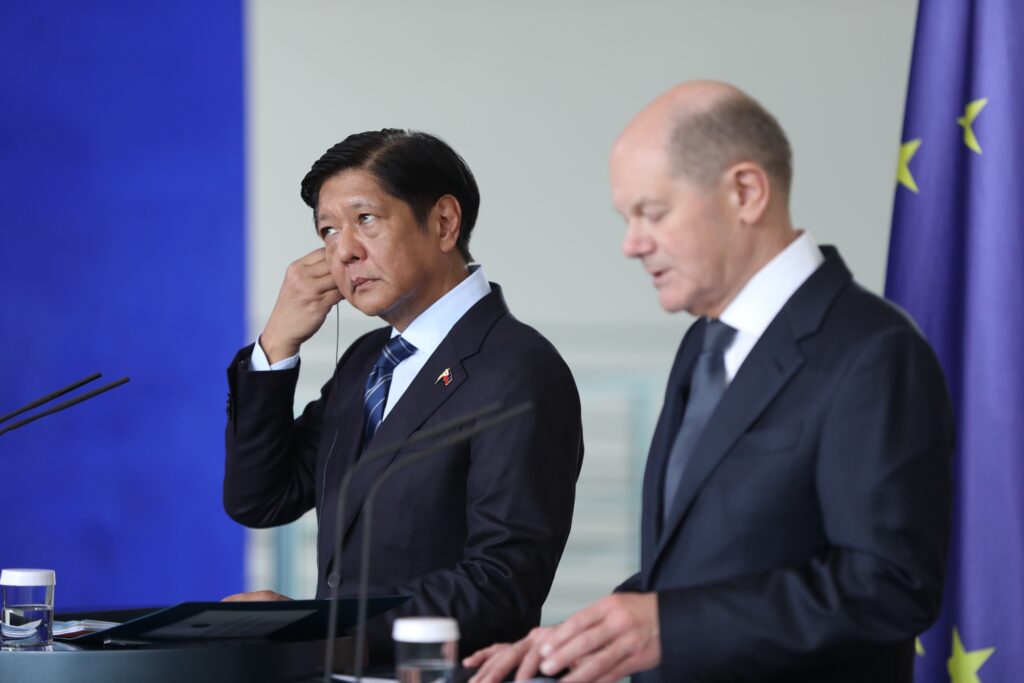On 25 March 2023, Philippine President Ferdinand ‘Bongbong’ Marcos Jr issued Executive Order No. 57 to establish a coordinated governance framework for maritime security and domain awareness, a move welcomed by many Filipinos.
But the issuance was criticised by his sister, Senator Imee Marcos who, in an official statement, claimed that it ‘welcomes many a Trojan horse of foreign interference, alluding to a provision of the executive order that allows donations and grants from foreign sources.
She highlighted the need for bilateral talks with Beijing, aligning with China’s insistence on ‘dialogue and consultation’ to resolve their maritime dispute.
But Beijing has imposed a precondition for a bilateral agreement — that the Philippines disregard the Permanent Court of Arbitration’s 2016 ruling on the South China Sea. President Marcos clarified his opinion on this in a statement before the Australian parliament on 29 February 2024, ‘I will not allow any attempt by any foreign power to take even one square inch of our sovereign territory’.
Malign foreign interference is a critical issue for many countries today, including Australia and the Philippines. The former has a comparatively more organised approach to counteracting malicious foreign interference, and it provides a good starting point to comprehend the Philippine situation.
According to Australia’s Department of Home Affairs, this offensive type of foreign interference ‘occurs when activity carried out by, or on behalf of, a foreign power, is coercive, corrupting, deceptive or clandestine, and contrary to Australia’s sovereignty, values and national interests’ and can manifest in many ways.
Of particular interest to the Philippines is malicious foreign interference implemented at the community level, which includes ‘community members being co-opted or coerced to advance the economic or political interests of a foreign country’. Expressing an opinion that contradicts government foreign policy is not necessarily treason or espionage. But taking the side of a hostile nation would warrant suspicion of malign interference.
A national security expert has raised concern about ‘cognitive warfare’ being deployed to weaken the Philippines’ resolve in defending its sovereignty. The National Security Council issued a warning about foreign interference possibly disrupting the midterm elections in 2025.
At the onset, law enforcement authorities should investigate whether the laws requiring the registration of foreign agents or prohibiting espionage have been violated. If warranted, the government can also pursue a corruption indictment or a conflict-of-interest case against public officials involved.
But the government still has no specific and direct way to address malign interference through the co-optation of high-profile community members by a hostile nation. The Philippines has yet to enact a statute devoted specifically to regulate foreign interference.
The discussion on how to deal with malign interference has heated up. One legal expert has urged the government to implement an array of legal moves such as ‘stricter application of our immigration rules and enforcing deportations’ and ‘strictly implementing criminal laws on Chinese workers’. One lawmaker proposed to regulate or ban foreign-controlled social media applications such as TikTok.
According to the Philippines’ Supreme Court, free speech ‘means more than the right to approve existing political beliefs or economic arrangements, to lend support to official measures, or to take refuge in the existing climate of opinion on any of public consequence’. The Supreme Court also stated that ‘a limitation on the freedom of expression may be justified only by a danger of such substantive character that the state has a right to prevent’.
The state’s duty to avert serious harm to the public would justify government intervention against malign interference, considering that a malicious coordinated effort by certain members of the polity to undermine the government’s foreign policy can gravely compromise national security.
Given that the Philippines is a constitutional democracy, any state intervention against malign interference must account for the political rights safeguarded by the country’s 1987 constitution. Policing and prosecuting malign interference should not automatically mean giving the state more draconian powers and diminishing the potency of constitutional rights. Suppressing free speech may lead to more anxiety and turmoil in the community and ultimately undermine national security.
Singapore’s Foreign Interference (Countermeasures) Act has been criticised for contravening ‘international legal and human rights principles — including the rights to freedom of expression, association, participation in public affairs, and privacy’. There is presently a real fear that the Act’s implementation will curtail activities in Singapore’s civic-political space.
A dedicated regulatory measure must institutionalise principles and protocols to guide law enforcement and national security agencies to distinguish between attention-hungry crackpots, genuine dissenting voices and traitors undermining the government. It should also contain mechanisms on how they can appropriately respond to each case.
The duty of the state to prevent public harm must never be construed as a license for law enforcement and national security agencies to disregard the constitutional prescriptions of free speech and peaceful assembly. The fundamental challenge is devising a nuanced approach that will ensure both the stability of the state and the sanctity of constitutional rights.
The reality is that apprehension about foreign interference has made the West Philippine Sea row even more tense. But it is precisely in this perilous time that the convenience to justify unconstitutional actions must be resisted. Those genuinely pushing for a sustainable and peaceful resolution must be encouraged to stand out.
Michael Henry Yusingco is Senior Research Fellow at the Ateneo Policy Center, Ateneo de Manila University.


Leave a Reply